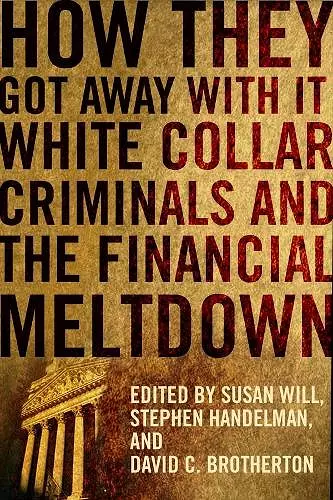How They Got Away With It
White Collar Criminals and the Financial Meltdown
David C Brotherton editor Susan Will editor Stephen Handelman editor
Format:Hardback
Publisher:Columbia University Press
Published:14th Dec '12
Currently unavailable, and unfortunately no date known when it will be back

A criminological investigation into the social, cultural, political, and economic conditions creating the 2008 financial collapse.
A team of scholars with backgrounds in criminology, sociology, economics, business, government regulation, and law examine the historical, social, and cultural causes of the 2008 economic crisis. Essays probe the workings of the toxic subprime loan industry, the role of external auditors, the consequences of Wall Street deregulation, the manipulations of alpha hedge fund managers, and the "Ponzi-like" culture of contemporary capitalism. They unravel modern finance's complex schematics and highlight their susceptibility to corruption, fraud, and outright racketeering. They examine the involvement of enablers, including accountants, lawyers, credit rating agencies, and regulatory workers, who failed to protect the public interest and enforce existing checks and balances. While the United States was "ground zero" of the meltdown, the financial crimes of other countries intensified the disaster. Internationally-focused essays consider bad practices in China and the European property markets and draw attention to the far-reaching consequences of transnational money laundering and tax evasion schemes. By approaching the 2008 crisis from the perspective of white collar criminology, contributors build a more general understanding of the collapse and crystallize the multiple human and institutional factors preventing capture of even the worst offenders.
We have clearly not learned the lessons of past financial debacles, a central one being that crime has played a significant role in them. Unlike traditional economic and legal analyses, this volume starts from the (correct) premise that criminal offending was a central phenomenon in the meltdown. Its contents provide diverse and penetrating analyses of how fraud occurred and how it might best be prevented. This work provides an excellent foundation for further academic research and needs to be on the desk of every legislator dealing with financial regulation. -- Henry N. Pontell, University of California, Irvine, coauthor of Profit Without Honor: White-Collar Crime and the Looting of America Criminology failed the challenges of the global financial crisis. In this book, leading criminologists put this right by explaining impunity for the crimes of financial capitalism. It is rich with insight on how Wall Street games regulation. When Goldman Sachs takes fat fees to help Greece conceal its debt, is fraud involved? Are millions of unemployed Greeks victims of fraud? Are we all? What of Goldman Sachs then placing bets on the failure of the Greek economy? These are the questions considered in this important work. -- John Braithwaite, Australian National University ...this book is a valuable resource for details about the financial crisis. Library Journal
ISBN: 9780231156905
Dimensions: unknown
Weight: unknown
384 pages